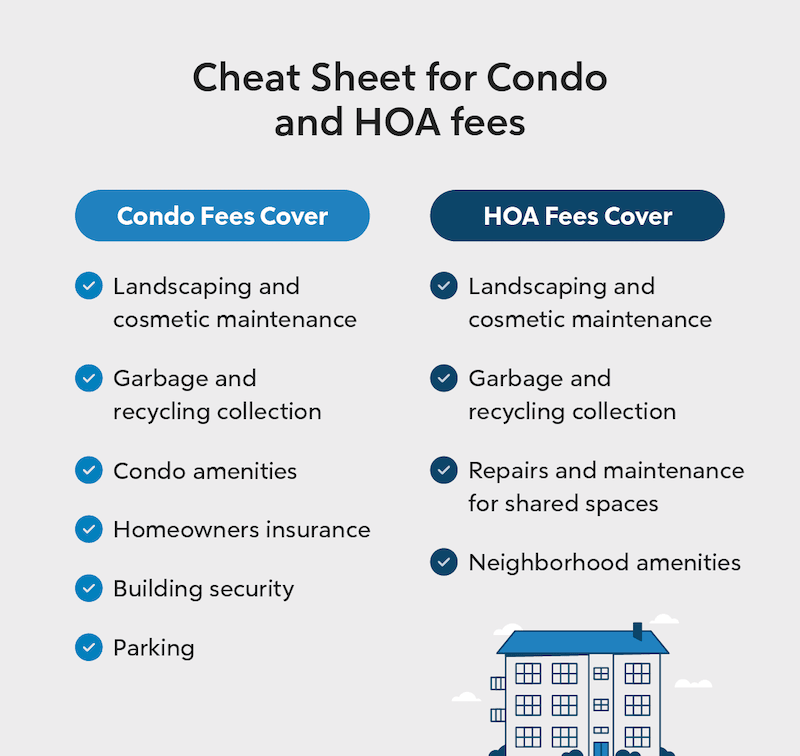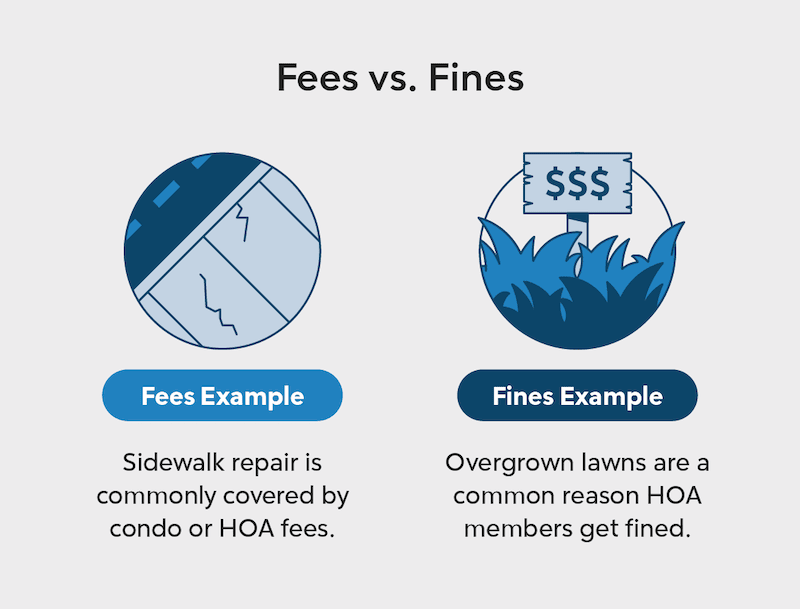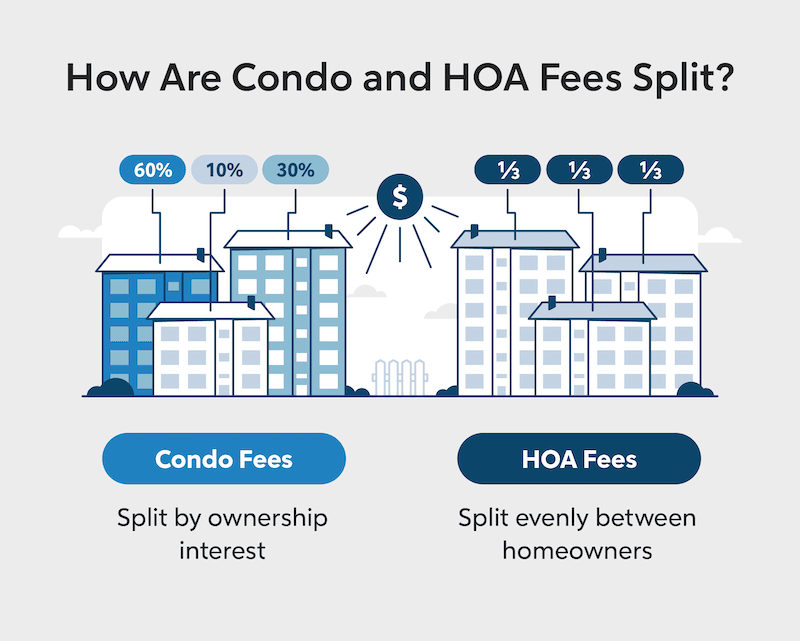When amenities include lush courtyards, state-of-the-art fitness centers or a 24/7 door attendant, it’s no surprise so many people consider moving to a new HOA community or condo building with these – and other – added features. But someone has to pay for these perks.
You’re likely wondering which fees pay for what amenities and the difference between condo and homeowners association (HOA) fees.
Because of how property is owned and shared in a condo building versus an HOA community, condo fees typically include more expenses than HOA fees. Usually, you pay condo fees to your condo association. And if your property is associated with an HOA community, you pay HOA fees to your homeowners association. But it’s possible to pay condo and HOA fees if a condo is in an HOA neighborhood or the condo complex has an HOA.
New homeowners may be unsure whether they’re paying condo fees, HOA fees or both. And they may not understand the differences between the two types of fees, particularly their costs.
Let’s explore the fees, how they differ and the amenities each typically covers.
What Are Condo Fees?
A condo or condominium is a residential building with multiple units that share walls. Condo owners own the inside of their units and share ownership of the building’s common areas and amenities.
Condo property management determines condo fees to cover upkeep and maintenance for the entire building. Condo fees are typically divided based on the size of each unit and its ownership interest. Owners with bigger or multiple units usually pay more than owners with smaller units.
Property management charges condo fees to cover the costs of maintaining the quality of living for all condo residents. And because condo owners split the ownership of shared areas, they split its upkeep, too.
See What You Qualify For
Buy A Home
Discover mortgage options that fit your unique financial needs.

Refinance
Refinance your mortgage to have more money for what matters.
Tap Into Equity
Use your home’s equity and unlock cash to achieve your goals.
What Are HOA Fees?
A homeowners association (HOA) sets and enforces property rules for residents in its community. The association typically has a board of directors that dictates the community’s rules and fees.
In an HOA, each homeowner owns their individual home, and the HOA typically owns the common areas, which is how it can enforce the rules residents must follow. HOA rules are intended to preserve property values, and homeowners are often fined if they break an HOA’s rules.
HOA fees cover the upkeep of amenities and communal areas, like swimming pools or dog parks.

Condo Fees Vs. HOA Fees
When you’re considering moving to a deed-restricted community, like a condo complex or neighborhood with an HOA, it’s important to know how fees work. Let’s discuss some similarities and differences between condo fees and HOA fees.
Condo Fee Coverage
Condo association fees typically cover amenities, including:
- Landscaping and cosmetic maintenance
- Condo amenities
- Recycling collection and trash removal
- A master insurance policy for the building
- Building security
- Parking lots
HOA Fee Coverage
HOA fees typically cover the maintenance of communal areas and services, such as:
- Landscaping and cosmetic maintenance
- Recycling collection and trash removal
- Neighborhood amenities
- Repairs and maintenance for shared spaces
- Snow removal and road maintenance
These fees can vary depending on the offered amenities.
Fee Amounts
Condo fees are typically more expensive than HOA fees. Condo owners own the interior of their units and share ownership of a building’s common areas and amenities. The monthly condo fees also cover the cost of maintaining common areas. On the other hand, homeowners in an HOA are responsible for repairs on their homes. Their HOA fees only include the maintenance of shared areas.
For example, if a homeowner in an HOA with a single-family home has a broken fence, the owner must pay the bill to repair it. If the owner lived in a condo complex, the security risk would extend to all owners, and they would all share the responsibility of fixing it.
Fees Vs. Fines

Fees are planned monthly payments. The expense covers repairs or maintenance and doesn’t change month to month. Fines are one-time penalties for breaking any rules or standards set by an HOA. Condominium associations don’t typically charge fines.
Some common reasons HOA members can get fined include:
- Repainting or renovating home exterior without approval
- Improper yard or lawn maintenance
- Parking violations
- Failure to complete cosmetic repairs in a timely manner
How Are Condo And HOA Fees Assessed?
For an HOA, the HOA board will determine the amount of fees. And condo fees are established by condo property management. HOAs typically charge each homeowner the same fee unless there’s a significant difference in the size of a home or plot of land. Condo associations typically charge fees to owners based on their ownership interest in the building, so fees are based on the size of an owner’s condo and their share of common areas.
If the condo or HOA fees can’t cover a necessary repair, homeowners may be charged a special assessment to cover the difference. A special assessment is a fee, not a fine. It covers a major repair or large, unexpected cost. Homeowners aren’t charged a special assessment because they broke a rule.

FAQs About HOA Fees Vs. Condo Fees
Now that you know the basics, let’s cover some common questions about condo fees versus HOA fees.
Do all condos have HOA fees?
Not every condo has HOA fees. A homeowners association is different from a condo association, and depending on the community, a condo owner could be responsible for either fee or even both.
What do most condo fees include?
Most condo fees cover the cost of security, parking, trash and recycling pickup, landscaping and cosmetic maintenance. Fees also cover shared condo amenities, such as a pool or courtyard and may even include a master insurance policy for the common areas of the building. This is not the same as the homeowners insurance that you will probably need for your individual unit.
What do most HOA fees include?
Most HOA fees include landscaping, cosmetic maintenance and neighborhood amenities, like a pool or playground. They often include any repairs and maintenance of shared areas.
How are HOA and condo fees assessed?
HOA fees are usually equally split between homeowners in an HOA, while condo fees are proportionate to an owner’s interest in the condo property.
The Bottom Line
Whether you’re moving to an HOA or condo complex, you need an accurate estimate of your monthly payments when financing your home.
Find A Mortgage Today and Lock In Your Rate!
Get matched with a lender that will work for your financial situation.

Victoria Araj
Victoria Araj is a Staff Writer for Rocket Companies who has held roles in mortgage banking, public relations and more in her 15-plus years of experience. She has a bachelor’s degree in journalism with an emphasis in political science from Michigan State University, and a master’s degree in public administration from the University of Michigan.












